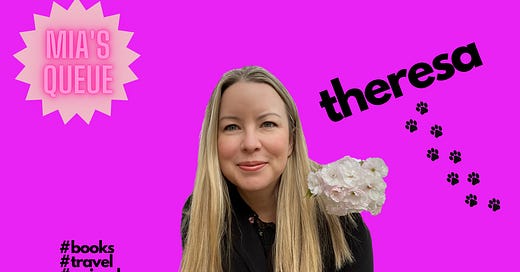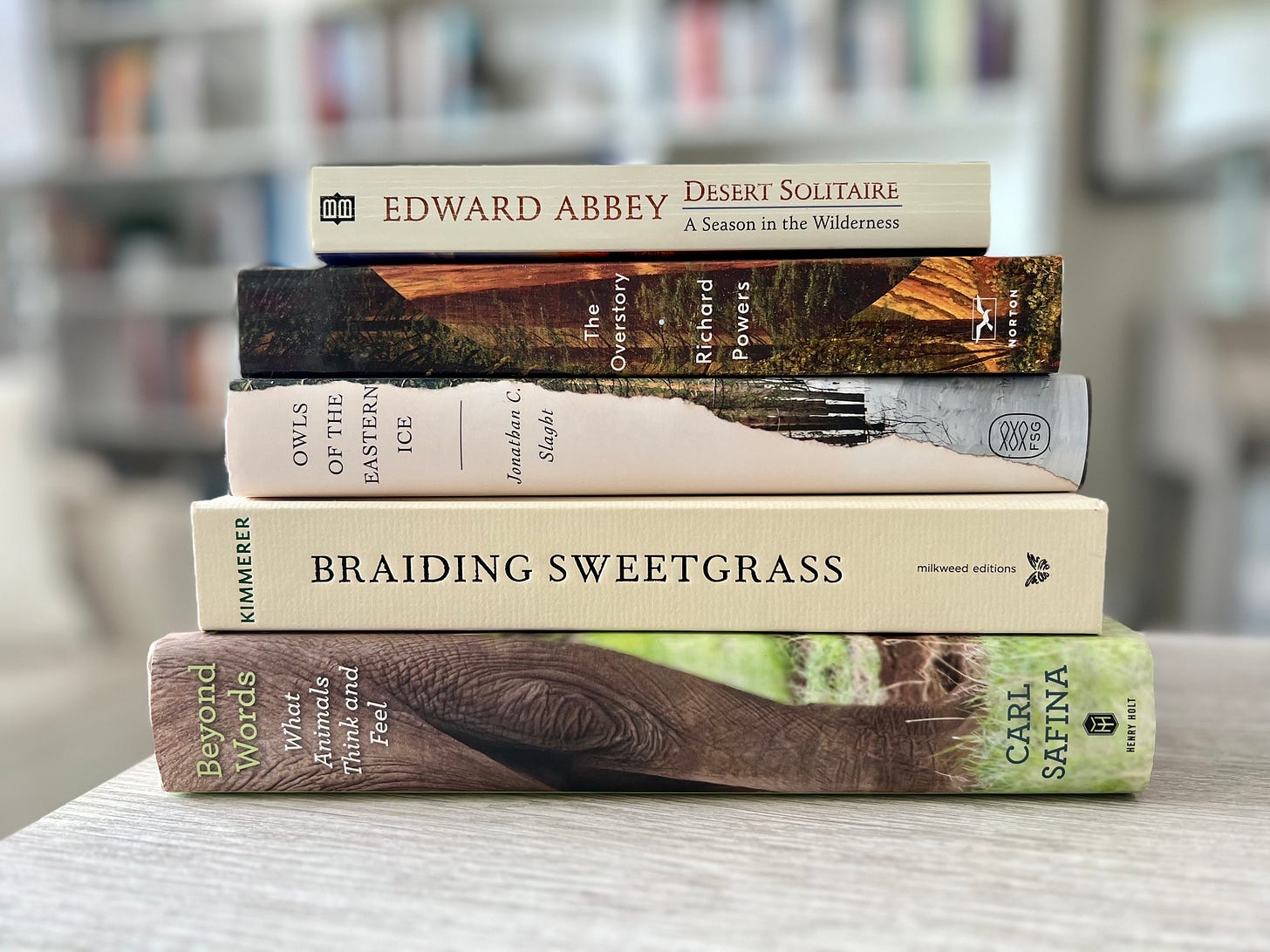#7: Theresa — Travel, Books, Conservation
“You can eat food, or you can taste food. The same is true in life.” Savoring the good things with an intrepid traveler and steward of the natural world.
Many of us can say that our jobs make a difference, but Theresa Duncan’s really does. As a Senior Director at the Wildlife Conservation Society, Theresa raises money from individual donors to save endangered species. A big part of her role is showing contributors how their gift is helping the planet and injecting hope into our ecological future.
I love being around Theresa because her passion — for animals, the natural world, travel, coffee, books — is infectious. She always has tip-top recommendations and rituals around discovering the best that life has to offer. In this interview, I was thrilled to learn about her unusual strategy for exploring new places, how she uses Google Maps in surprising ways, and her must-read books for animal and nature lovers.
Do you think of yourself as a tastemaker?
I don't think of myself as a tastemaker as much as maybe a taste connoisseur — a taster rather than a tastemaker.
What’s it like being a “taster”?
You can eat food, or you can taste food. And the same is true in life: you can live life or you can taste life — whether that's books, music, travel, or friendships, there's an opportunity to really savor the experience and seek out new flavors.
The starting point is to try anything and everything related to what you love. Taste it all. Explore it all. And before you know it, you'll become an expert, simply by paying more attention to what you love.
How do you savor experiences?
To me, it's a practice of being more present. And when I seek out new experiences, I find myself more present than in the monotony of daily life.
What rituals do you have around tracking what inspires you?
I think you're hinting at something really important there: I do have a process. I wish I could fancy myself as someone who's just spontaneously making all these discoveries, but when I reflect on it, I'm quite deliberate.
At the beginning is researching. I'll use Costa Rica as an example. When I was planning to spend time in Costa Rica, I tried not to plan too far in advance because then the momentum or magic starts to lose its shine. So in the weeks leading up to going to a place, I'll really start looking at what is special about Costa Rica. What is Costa Rica known for? What is something I wouldn't want to go to Costa Rica and miss out on?
So I have a mix of things that I know I'm going to love and then I try to just be really open to different possibilities. I know I'll have some kind of nature element wherever I am. I'll research something that puts me in nature in that country.
I know I'm gonna love some kind of food experience, and I try to make it something that I couldn't get anywhere else.
I also think there's there's something to be said for traveling solo. Sometimes, when you're traveling in groups, which I also love to do, you kind of go with where the current of different opinions and voices takes you.
How do you research a trip? Do you have specific guidebooks that you really value?
My old way of doing it is behind me somewhere [points to bookshelf]. There it is. All the Frommer’s books.
I haven't bought a guidebook in years now. I primarily search on the internet, favoring certain types of bloggers who talk about their experiences. Usually, within the first paragraph or two, I get a sense of if the person has spent significant time in this place. Someone who's lived in the region, or has visited every year for 10 years, I tend to trust their lists and recommendations. And then I try to cross-reference. If I see the same place show up on several lists, it usually gets elevated to a priority.
Then I try to go off the beaten path. I have two ways of doing that: One, I always go to bookstores when I'm traveling. Instead of going in a passive way, I engage in conversations with the booksellers. I ask them: “What is the one book written by someone from this city that I should read? What is the one book that best describes the culture of this country that I'm in?” The books they recommend are fantastic.
The second one is a little bit weird. I don't think I've told anyone this yet. I try to make sure that I go to a hardware store when I'm traveling. This is bizarre. But my rationale for it is: if I find myself in a hardware store, it means I'm outside of the tourist zone. It also makes it more like this is where real people live. These are where people buy their doorknobs and their nuts and bolts.
What tools do you use to save your experiences and ideas?
It’s not very glamorous, but what has really worked is using Google Maps. Google Maps allows for all sorts of different labels for places. Their three standard labels are want to go like (a flag you can plant on different places), starred places, and favorites. So when I'm about to go to a new city, I will label everywhere I want to go. Then, when I'm literally walking the streets, I can look and see what's an area that I've already marked on my map. I can plan my day around particular neighborhoods or areas. And then if I love the place, I then toggle it to Favorites, instead of just “want to go.”
And then here's the new thing I just started, which has been helpful: If I'm in Costa Rica, or Lisbon, or Tokyo, I will, in Google Maps, just save it to “Theresa’s Favorites in Tokyo.” Now, when someone says, “Oh, do you have any ideas of where I should go in Lisbon?” I can literally send them my Google Map! It's the best tool.
OK, now let’s hear your recommendations.
I’ve picked out 📚 five books about nature and conservation. They're books that I love, and I know others will too.
“Beyond Words: What Animals Think and Feel” by Carl Safina
This is a book for anyone who loves animals and wants to learn more about animal behaviors and emotions. Actually, any book by Carl Safina is worth picking up; he's written about a number of different species. All of his books are a joy to read.
“Braiding Sweetgrass” by Robin Wall Kimmerer
I'm just a few chapters in, and I already can confidently say this is one of my favorite books. It's an important voice for our modern times.
“Owls of the Eastern Ice: A Quest to Find and Save the World’s Largest Owl” by Jonathan Slaght
This is written by one of the scientists at my organization, Wildlife Conservation Society. It's a really splendid book about owls and conservation.
“The Overstory” by Richard Powers
I can't say enough good things about this book. If you love trees, you have to read this book. If you're not interested in trees, then you really have to read this book, because it will show you how amazing trees are. And it's written in a wonderful way that weaves together the story of trees and the story of people. It's really a great read.
“Desert Solitaire” by Edward Abbey
This is a classic book. It's about nature and national parks. It's written by a very complex author. He is all at once a rebel, a philosopher, and one of the early and true conservationists. It's a joy to read, and his voice will stay with you for years and years to come.
Mia’s Queue is a free newsletter featuring an ordinary person with extraordinary taste. Subscribe to get posts like this in your inbox every other Thursday.
In case you haven’t noticed, I love people with good taste! In fact, I have a podcast about it for Flipboard. Check it out!
More Mia’s Queue: Vasha • Eva • Sarah • James • Adi • Letitia






I'm lucky to call Theresa my cousin ♡ she is so amazing, brilliant, brave and just a wonderful human & advocate for the planet!